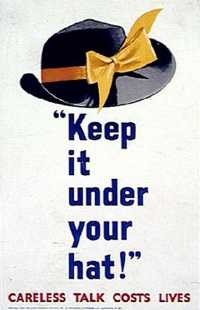The British psychological tricks used to defeat Hitler
An October 2016 book reveals how the methods of the British information service managed to manipulate public opinion in favour of the allies.
‘Have weapons and threats changed the course of the world?’
It’s possible, but in these days of the internet intelligence has become more crucial than ever. Beforehand, those who gave dominant speeches gained a great deal, and in times of war, to manipulate the masses is easier. The fear, prejudice and urgency favour the malicious rumours and are the most useful in destroying the enemy.

The book, ‘Persuading the People: British Propaganda in World War II’ (British Library) by the historian David Welch, who has listed the most successful strategies performed by the British Government during those years which changed the world for the worse, and Fiona Macdonald commented on the BBC ‘Welch signals the difficult equilibrium which he was searching for: after World War I, the official propaganda had been converted into a symptom of lies and disinformation, and had the intention to influence the most cynic of the population, when telling the truth whenever possible’.
SLOGANS
In 1940, John Reith was named acting Director General of the BBC, by the Information Ministry. In the words of Welch, ‘it was based on two fundamental axioms for impartiality in the war: the news which reaches the troops and the battlefields must be always truthful’. As far as the techniques used to manipulate public opinion are concerned, these processes were developed and then put to the test. A report from Chatham House in 1939 established 86 rules to achieve it.
What the historian finds interesting, ‘these rules were paraphrasing the propaganda of Hitler in ‘Mein Kampf’. Not only this, it appears to support the Nazi principals. For example, the document talks of calling to the instinct of masses and their reasoning, and underlines the importance of slogans, which have to be continually repeated’
DEATH OF THE REGIME
The second psychological strategy from the allies was the ‘Anger Campaign’. ‘The Information Ministry had decided that the truth is the best weapon to attack the enemy in the mind of their public’ writes Welch. ‘However, after the bitter and dramatic events in the summer and autumn of 1940, it brought into evidence the brutality of the Nazi regime’.
At the start of the war, the Ministry spoke of ‘impatience and an implicit lack of public confidence; defined at the time by the Information Minister Lord Macmillan ‘patient, suffering, slow to react to anger, and less so to hate’. He thought the working class man in particular had no idea what a Nazi victory would lead to, and so we need a ‘firm and strong’ voice.
The Hate Campaign had to function to combat ‘dangerous complacency’, according to the Information Ministry, who embarked aggressively ‘The smoke is at your door, it is revolting and destroying. It kills mothers and children’ resorting to exaggerate the problem. The British writer and radio presenter J.B. Priestley participated by contributing a more subtle form of hate, speaking on the radio about the positive things about Germany: music, arts and beautiful landscapes…and then when his picture was drawn he would add the Nazis had destroyed all of it. What was left of this European country was only, according to a BBC article ‘the dark side, of broken promises and interminable deceit, the police took on the role of the Imperial Soldiers in Star Wars, the feared Gestapo and bloodied basements’
RUMOUR, RUMOUR
In the time of total war, civilians were called to duty and then once again propaganda came into play. It was not only getting the soldiers to risk their lives, but to implicate the entire population as a single man – ‘War is the people’ we are all in the trenches, at least mentally.
Then the period of espionage and spying took centre stage and reached every citizen. ‘Don’t carry your personal diaries, they could fall into the hands of the enemy’ read one of the posters.
After the battle at Dunkirk with the French, it ended with the expensive evacuation of British soldiers, and was exploited with the possible creation of the Fifth Column – a German front line.
The Information Ministry popularised this ‘Careless talk cost lives’ and ‘the enemy is inside’. They invented characters such as ‘Mr Secrecy Hush-Hush’ or ‘Miss Leaky Mouth’ and called on the citizens to report anything suspicious to the Police.
V FOR VICTORY
This famous slogan was launched by the very BBC in July 1941.
The historian tells in his book the idea ‘was inspired by Victor de Laveleye, the former Justice Minister in the Belgian Government, who transmitted the French broadcasts from the BBC. The French word ‘victoire’ was used as a symbol of unity and the V for Victory travelled worldwide.
‘The BBC broadcasts into occupied Europe urged the listeners to write or engrave the letter V wherever they could’.
